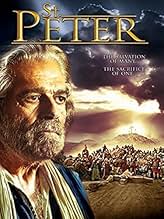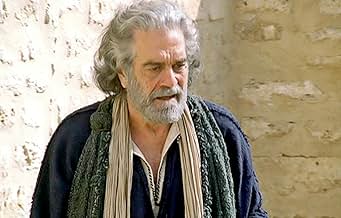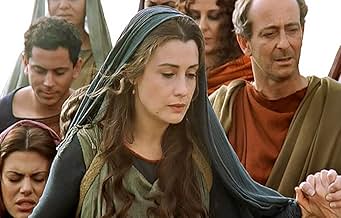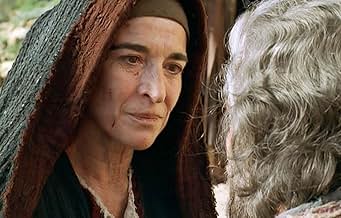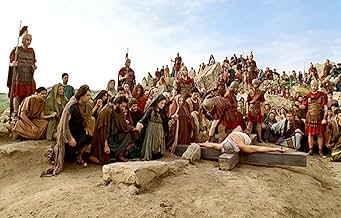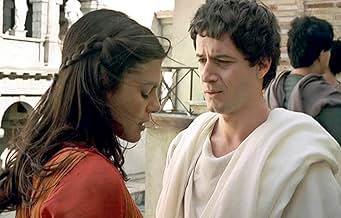Ajouter une intrigue dans votre langueSaint Peter, a reluctant but passionate leader, from the crucifixion of Jesus to his own. The film's first half dramatizes the New Testament's "Acts": early fear, the renewal of Pentecost, S... Tout lireSaint Peter, a reluctant but passionate leader, from the crucifixion of Jesus to his own. The film's first half dramatizes the New Testament's "Acts": early fear, the renewal of Pentecost, Saul's conversion, the decision to baptize pagans, and the Apostles' dispersal. In the seco... Tout lireSaint Peter, a reluctant but passionate leader, from the crucifixion of Jesus to his own. The film's first half dramatizes the New Testament's "Acts": early fear, the renewal of Pentecost, Saul's conversion, the decision to baptize pagans, and the Apostles' dispersal. In the second half, an aged Peter goes to Rome to join Paul, arriving on the day of Paul's arrest. Pa... Tout lire
Histoire
Le saviez-vous
- AnecdotesThe length of this film is 4 hours and 25 minutes
- ConnexionsFollows Imperium: Augustus (2003)
These words that appear many times in the magnificent latest movie by Giulio Base are not just the words that relate to early Christian attitude but they are clearly reflected throughout the film made with honest effort and great faith both from the crew and the cast. I have seen many religious historical epics. Nevertheless, I have to admit that seldom have I seen such a purely faithful movie where almost each moment is an experience. Let me discuss some of the aspects of the film that make it a brilliant piece of film art.
CONTENT: Giulio Base's film can be divided into two parts concerning the content. The first part discusses purely historical events from the New Testament, beginning with the death and resurrection of Christ and going on to Apostles' meetings, conversions to the new faith, quarrels who actually has the right to be baptized, persecutions from Jews, the miraculous story of Saul/Paul, and ending with Peter's journey to the heart of the empire, Rome. The events showed in the second part take place primarily in Rome, with some fictitious characters that are contextualized in the whole life stories of Peter and Paul. We see two families whose lives are connected by love and faith. Claudius Maximus (Ettore Basi), the son of a wealthy Roman, Persius (Ennio Caltorti), falls in love with a Christian girl Silvia (Bianca Guaccero). He does not see any benefit in the new faith at first but slowly starts to believe in the Son of God. Will this help him retain good relations with his family? Moreover, a mystery from his family's past is revealed at the moment of the death of Claudius' Grandma... In the other family, David (Flavio Insinna), the masked gladiator called Trachus, fights on arena as a gladiator. However, he hides this truth from his Christian wife, Anna (Claudia Koll). Yet, his life in two worlds cannot last forever and he once has to stand before the choice... earthly or spiritual freedom?... Among these vivid stories, the director shows Peter-Paul relations. Sometimes, they are exaggerated because these two have not met so many times and probably died on the same day not having met in prison before. Yet, it must be treated rather in the symbolic way. The primary fact about them is that they were the two greatest Apostles of Christ's Church. In the end, we see the persecutions of Christians and Peter who leaves Rome and meets the Lord on his way who is going to be crucified again...
BEAUTIFUL MOMENTS: The film is filled with a number of magnificent scenes that I deeply experienced to tears. If you decide to see the movie, pay attention to little aspects that are perhaps not so clear at once but noticed after a longer inspection. These aspects, which I noticed at the second viewing, are the real pearls of the film. These are, among many others, the visit at Cornelius' in Caesarea, the Eucharist in prison, the symbolic moment of joy at Christ's resurrection, the conversation with a prostitute ("Is there really such a God who will forgive?") or Paul's miraculous way for Damascus. Except for the above, I will never forget Sylvia-Claudius conversation in his beautiful gardens. "What do you lack? What more is there that can make you happy? asks Claudius. Immediately, the question is answered by a voice coming from the streets of Rome "Jesus is true happiness!" I also loved the moment of retrospection in time. Peter decides to put up his mission in Rome but unintentionally comes back in memory to the words of Christ: "You are the rock and on this rock I shall build my Church". The end is also unbelievably beautiful and touching, which refers to one historical and spiritual fact: Rome has changed forever and the whole world will never be the same since the Redeemer makes all things new...
CAST: Among the films about Peter's elderly years in Rome, Omar Sharif portrays the fishermen of people in the most memorable way I have seen so far: better than Dennis Quiley in A.D (1985), more authentic than Franciszek Pieczka in QUO VADIS? (2000), even more appealing than Finlay Currie in Hollywood's monumental production QUO VADIS? (1951) by Mervyn LeRoy. He is great with that blink in his eyes that probably real saint Peter had and at showing love for all men that real saint Peter learned from his Lord. Omar Sharif is magnificent and even if you are not religious, you will love this film thanks to his performance. Other cast are not that famous but they give fine performances, too. I particularly liked Bianca Guaccero in the role of gentle young girl Silvia, so in love with Claudius. Among others, these are Italian cast who very well fit to the roles of the Romans.
LOCATIONS: There is one more reason why I like the movie. The landscapes that the film shows are very much like the ones in Palestine. After my journey to the Holy Land, I deeply feel this sense of authenticity. Therefore, some biblical films seemed so unnatural because they were made in wrong locations. Giulio Base's film does a great job throughout, including the Sea of Galilee, Capernaum, the reconstruction of the Jerusalem and the Rome of the 1st century. So far, such an authentic film concerning locations was Franco Zeffirelli's production with Robert Powell.
I would recommend everyone to see this film, no matter if old or young, Christian, Jew or Muslim, believer or atheist. It is a splendid film which is not a "Christian propaganda" as some cynical people unjustly call such films. It is the film which primarily focuses on the dignity, freedom and love of every human being. 10/10 Excellent movie that I dream to see for the third time!
- marcin_kukuczka
- 24 mai 2006
- Lien permanent
Meilleurs choix
Détails
Contribuer à cette page


